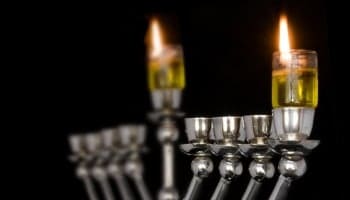Celebration
Chanukah is a celebration of the miracle of Jewish spiritual survival. After millennia of attempts to assimilate us, whether through force or persuasion, we are still here. But, it is not mere physical survival that we celebrate. After all, the genes of the Egyptians, Assyrians, Babylonians, Persians and Greeks have also physically survived. The miracle of Jewish survival is that we have survived with our spiritual heritage intact. When we light the Chanukah candles today we are extensions of the Maccabees lighting the Menorah in the rededicated Second Temple and the Priests in the First Temple of King Solomon. Ultimately, we are even continuing the lighting of the first Menorah in the Sinai Desert by Aaron the High Priest, brother of Moses.
The lights of the Chanukah candles are also a potent reminder that physical might and numbers do not necessarily prevail. As the prophet Zechariah stated, “Not by might, not by power, but by My spirit, said the Lord of Hosts.” The miracle of Chanukah was the victory in which God delivered
…the powerful into the hands of the weak, the many into the hands of the few, the impure into the hands of the pure, the evil into the hands of the righteous, and the violent into the hands of the those who are devoted to the Torah.
A traditional pastime on Chanukah is playing the dreidel. The dreidel is a four sided spinning top with a Hebrew letter on each side. The letters (nun, gimmel, heh, shin, or peh) begin the words in the Hebrew phrase “A great miracle happened there” (or inn Israel – “here”). Children play a game in which candies or coins are won or lost depending on which side the dreidel lands. Playing dreidel is more than just a bit of holiday fun, however. It teaches us a profound lesson about Jewish history. The dreidel symbolizes the four major exiles that the Jews have experienced: Babylon, Persia, Greece and Rome. Just like a spinning dreidel, each of these empires has its moment in the sun but will eventually fall. In history, as with the dreidel, only two things remain constant, the point on which it revolves and the handle above. The point around which the dreidel revolves is the eternal Jewish people, while the “hand” from above which spins the dreidel of history is the Divine Providence of God.
As in almost all Jewish festivals, food plays a role in the celebration. On Chanukah it is customary to eat dairy foods to remind us of the heroism of Yehudit, daughter of Yochanan the High Priest. When Yehudit was taken to be defiled by the Greek ruler Holofernes, she served him cheese, to make him thirsty, and wine, to quench his thirst. After getting Holofernes completely drunk, she decapitated him (this was illegal in Greece at the time). This event sparked the Maccabean uprising. Food fried in oil is also eaten to commemorate the miracle of the Menorah. Latkes, which are fried pancakes made of grated potato, grated onion and eggs are usually eaten with apple-sauce (or sour cream for the brave of heart). In Israel, deep-fried jelly donuts, called sufganiyot, are the quintessential Chanukah delicacy.

